| Reviews & Columns |
|
Reviews DVD TV on DVD Blu-ray 4K UHD International DVDs In Theaters Reviews by Studio Video Games Features Collector Series DVDs Easter Egg Database Interviews DVD Talk Radio Feature Articles Columns Anime Talk DVD Savant Horror DVDs The M.O.D. Squad Art House HD Talk Silent DVD
|
DVD Talk Forum |
|
|
| Resources |
|
DVD Price Search Customer Service #'s RCE Info Links |
|
Columns
|
|
|
Autobiography of Nicolae Ceausescu, The
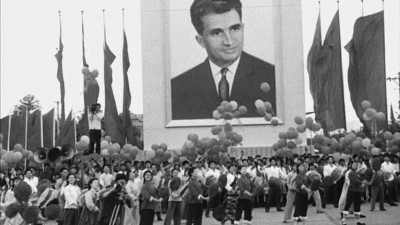
It seems serendipitous that I was granted the opportunity to view and review Andrei Ujica's stunning 2010 documentary The Autobiography of Nicolae Ceausescu so soon after having experienced (under the same DVD Talk auspices) Jean-Luc Godard's 1976 film Comment ça va?, which has a strong thematic connection to Ujica's film. The Godard movie is all about (over)interpretation and (over)manipulation of documentary footage and news-media photographs -- omissions, reframings, and captioning, "helpful" information and commentary fixing and reducing an image in a way that robs it of its nuanced complexities, and us of our own confrontation with and experience of it. The Autobiography of Nicolae Ceausescu could've been conjured by Godard's criticisms: It is the perfect cinematic answer to the possibility implicitly raised and demanded in Comment ça va?, its longed-for hypothetical scenario made manifest: What if the photo or the footage came to us unfiltered, speaking for itself, and we in turn had to read it, discerning for ourselves what was being depicted and what it meant?
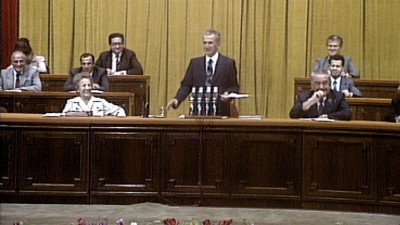
Ujica's subject, former Romanian head of government Nicolae Ceausescu (General Secretary of that former Iron Curtain nation's Communist Party from 1965 until his overthrow and execution in 1989 in the wake of the Soviet Bloc's disintegration) was, apparently at his own insistent behest, constantly captured on camera, both for the state propaganda machine in his charge and for his own monumentalizing archival impulses; Ujica and his collaborator, editor/sound designer Dana Bunescu, have compiled three hours of the most salient footage from Ceausescu's effectively unopposed "campaigns" for election, his public appearances, his presence at official functions, and home movies to give us -- with a bare minimum of manipulation or comment, and with a Herculean resistance to any of the ample opportunities for ironic emphasis or pointed juxtaposition (aesthetically speaking, this filmmaking team is the anti-Michael Moore) the material leaves wide open -- an "autobiography" on film, a highly subjective, self-invented story of Ceausescu's life, reign, and nation as he shaped and imposed it upon his culture, a distorted fever dream running parallel to, but never meeting, a real Soviet-era Romania of harsh economic strife and rampant fear and suffering under this leader's hated, oppressive, abusive (even by Iron Curtain standards), authoritarian regime.

We glimpse just enough intimations of Ceausescu's well-known terrorizing criminality -- the brief 1989 videotape snippets that open and close the film, with a defiant Ceausescu, on trial and soon to be executed, recorded by his victorious opponents as they accuse their sneering, unresponsive former dictator with a laundry list highlighting the Ceausescu-era police brutality and tyranny; the anxious, tense scrambling, seen intermittently throughout the film, of ordinary Romanian citizens in their workplaces to oblige a visiting, monitoring Ceausescu with the prosperous, happy, false vision of his people he insists upon -- to let us know that what we're seeing is not objective in any way. We can actually see that it was never meant to be; "autobiography" is the only word for this official self-portrait of a man profoundly ambitious, impressed with himself, and in a position to shape his society's representation of reality so that his autobiography became indistinguishable from the official biography of the Romanian state and people. This is why the Romania we see Ceausescu trying to appear to be benevolently ruling with impeccably principled Marxist integrity looks nothing like anything we know of it from history or realistically-minded fictional films (like Cristian Mungiu's 4 Months, 3 Weeks, and 2 Days, set in 1987 and highly observant of the grimness of Romanian life in the latter days of Ceausescu's administration): You can be certain that any of Ceausescu's projects ostensibly improving the lives of Romania's socialist paradise are coming along swimmingly every single time he pays a visit to check on their progress, and that any bakery or grocery Mr. Ceausescu enters (with his entourage, representatives from the media, and of course someone filming it all for propaganda and posterity) contains nothing but beautifully organized, clean shelves and cases stocked to bursting with fine, fresh, delicious food offered up by ever-smiling, contented staff (or do those smiles seem a bit on the nervous, glued-on side?); every auto factory or construction site he graces with his presence is peopled with only the most fulfilled, proud, productive workers, and Ceausescu in general is greeted as the beloved man of the people he presents himself as in the many falsely modest, grandiose, emptily Marxist-Leninist speeches Ujica has also included.
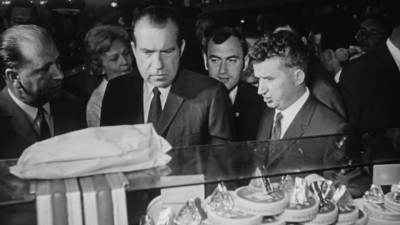
But again, there's no clever cutting to underscore the jaw-dropping hypocrisy, cognitive dissonance, and self-delusion in Ceausescu's nonstop PR campaign. None is necessary: Because Ceausescu, like all megalomaniacs, was unremittingly blind to his own hypocrisies, Ujica and Bunescu have a remarkably pure case on which to test their Godardian hypothesis, keeping any editorializing strictly to themselves (to the point that we learn of places, names, and dates incidentally; absolutely nothing is labeled or "presented" to us as such by the filmmakers) and mostly following a straightforward chronological timeline comprised of unadulterated public record from the state and TV archives, letting the footage they've compiled play out as it was meant to, a picture made pretty through blatant, rigorous omission. It works amazingly well. The images we're seeing are saturated with lies -- could the man self-righteously espousing egalitarian socialist ideals really be the same eager figurehead we see feted like a rock star, for example on his birthdays, by gaudy, ludicrously overblown, fascist-spectacle pageantry at home and abroad? (Ujica and Bunescu don't have to suggest or imply that the streets and stadiums full of lavish, worshipful displays organized for Ceausescu in Bucharest, in North Korea, and in Maoist China are absurd; the only ones who could be truly oblivious to this obvious state of affairs are the likes of Ceausescu and Mao themselves.) But the truth is there, regardless, plain to see in the celluloid and videotape; we can see, hear, and deduce it for ourselves without the onscreen interpretation and fixing of meaning whose common, problematic presence in most more ordinary documentaries is thrown into sharp relief by Ujica's and Bunescu's principled withholding of it here.

Its success as an experiment in documentary filmmaking expressly suspicious of mediation (there's still no such thing as unmediated in this context, of course; there is always the unobtrusive but unavoidable compiling/selecting and editing-down from multiple other possibilities that Ujica and Bunescu undertook in their authorial roles) means that The Autobiography of Nicolae Ceausescu is a distinctly unsettling experience, one that immerses us in a most tense, strange, palpably wrong environment whose falsity lingers even though no finger is being put on it -- a dreamscape where idealized symbolism is being forcibly fused with reality, whose signs we must read for the true, unpleasant story lurking, always, outside the frame (both the literal frame of the image and the metaphorical one in which Ceausescu enclosed official Romanian "reality"). Its seemingly excessive length works not just in terms of thoroughness, but as an experiential testament to Ceausescu's bottomless, tireless, exhausting capacity for self-delusion and infliction of mandatory mass denial. By the end, the tension arising from the mounting disjunct between one's bullshit detector and the blatantly self-serving, self-aggrandizing untruths that Ceasescu lives, breathes, and propagates (he even believes them, as far as we know; he never gives a single indication otherwise) becomes overpowering, nauseating; you may want to scream. Meaning that, quite to the contrary of what Ceausescu had in mind when this "autobiographical" footage was made, it reveals after all, in a way felt viscerally by the viewer, something deeply true and profoundly disturbing about the actual Romanian experience under Nicolae Ceausescu.
.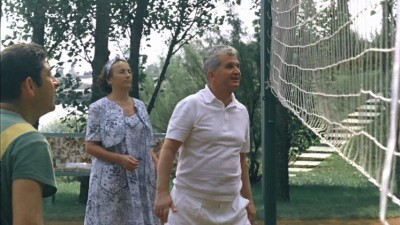
Video:
The transfer, which presents the film at the anamorphic-widescreen aspect ratio of 1.78:1, is a thorough and faithful representation of the film's various, mostly rough-hewn visual styles, from home movies and early-videotape news footage to archival/documentary 16 mm, on-the-fly shots and some spectacular full-color recordings of some of the gaudier pageantry trotted out on Ceasescu's behalf. Much of it reveals the age and expedient/cheap/primitive quality of the materials used for filming, which is all absolutely intentional and part of the film's look and feel. No discernible compression artifacts such as aliasing or edge enhancement are present, and no digital tampering has over-smoothed the different textures of celluloid and tape on display here, so the particular, found-footage, collage-like experience of the film is left nicely intact.
Sound:The disc's Dolby Digital 2.0 stereo soundtrack renders the often endemically scratchy or distorted original sound of the film's collected materials (in Romanian with non-optional English subtitles), and Ujica's and sound designer Dana Bunescu's occasional subtle and unobtrusive manipulations, as fully, clearly, and resonantly as possible. As with the visuals, the rough, scattershot, "found" qualities and textures of the audio are an important part of the film's experience and meaning, and the sound as it is rendered here is highly conscientious of and faithful to that intention on the part of the filmmakers.
Extras:--The film's theatrical teaser trailer.
--A DVD-ROM supplement, Who's Who in The Autobiography of Nicolae Ceausescu, which, as the film doesn't contain any information regarding who the figures are (they are mostly recognizable, but even the historically astute or those of us who remember the tail end of the Cold War could profit from knowing who some of the more specific and/or minor players are), makes for a handy and thoughtful guide to facilitate further understanding of the film.
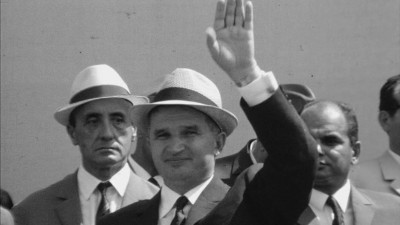
An up-close look at the looming, reassuring, smiling face of a nation's prolonged nightmare (it still hasn't fully awakened), The Autobiography of Nicolae Ceausescu is a nonstop journey, as enlightening as it is horrifying, into the pure, delusional subjectivity of the benevolent-appearing, velvet-gloved-and-iron-fisted Communist Party General Secretary/dictator of Romania from 1965 to 1989. It lets its subject speak for himself, and as such is counterintuitive to what documentaries usually try to give us, but it's brilliant, shocking, a little sickening, and astoundingly effective. Director Andrei Ujica and editor Dana Bunescu have carefully compiled three hours of the most exemplary Ceausescu-besotted propaganda, documentary, and home-movie footage from the Romanian state and TV archives, and we're dumbfounded over and over again by Ceausescu's "man of the people," pro-proletariat speechifying juxtaposed (without any undue, unnecessary underlining or interjection from the editing table) with all the gaudy, expensive, cryptofascist pageantry centered around him anywhere he goes in the Communist world, and by the simulacra of a booming, bustling, happy Romanian socialist paradise presented to him (and in turn by him, to foreign visitors) even though history (and, if we look closely, the "happy," frightened faces of all the factory workers, farmers, bakers, and planners bowing and scraping obligatorily to their leader) tells us a story of rampant privation, misery, oppression, and corruption behind the Iron Curtain. And especially Romania; as we can infer from his denunciatory perorations in the film's final hour, Ceausescu remained recalcitrantly, belligerently authoritarian and stuck to his story even as Gorbachev and the fall of the Berlin Wall spelled the end of his way of governing. The results of Ujica's meticulous research -- which are projected for us wholly unaccompanied by commentary or irony of any kind -- and careful avoidance of any but the most obligatory mediation come across as unusually simple, washing over us in a flow of that "objective" aura automatically provided by home movies and news footage. But the blatant falseness and hypocrisy of Ceausescu, his image, and what he megalomaniacally and incorrectly believed he was doing for (rather than to) his people are so clear, so incessant, that any comment or special emphasis would be superfluous and compromising; this stuff parodies itself. It's nearly unbelievable; we need a picture like The Autobiography of Nicolae Ceausescu as visible proof of such a mind-boggling disjunct between a leader's violently imposed self-image and the actual, notorious realities of his reign. Our reflexive resistance and nausea in the wake of Ceausescu's own, self-adoring "autobiography" is fully sufficient to let us feel viscerally, at least for a few hours, how flabbergasting , exhausting, and dispiriting (if on occasion very sardonically humorous, if you could muster a rueful laugh) it must have been to live in his world -- and to remind us, in a way as effective as Orwell, to be ever wary of the same, more sophisticated and subtle (and therefore more insidious) manipulations of image and boldly falsified versions of reality habitually perpetuated by power, not only in past times and repressive places, but in the here and now and much closer to home. Highly Recommended.
|
| Popular Reviews |
| Sponsored Links |
|
|
| Sponsored Links |
|
|
| Release List | Reviews | Shop | Newsletter | Forum | DVD Giveaways | Blu-Ray | Advertise |
|
Copyright 2024 DVDTalk.com All Rights Reserved. Legal Info, Privacy Policy, Terms of Use,
Manage Preferences,
Your Privacy Choices | |||||||












